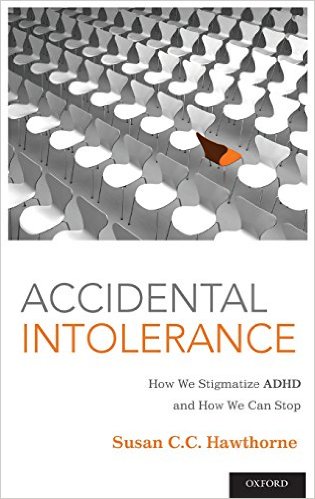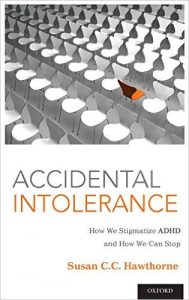Accidental Intolerance: How We Stigmatize ADHD and How We Can Stop 1st Edition


[amazon template=iframe image2&asin=0199977380]
In Accidental Intolerance, Susan Hawthorne argues that in the past few decades, our medical, scientific, and social approaches to ADHD have jointly — but unintentionally-reinforced intolerance of ADHD– diagnosed people. We have packed social values, such as interests in efficiency and productivity, into science and medicine. In turn, scientific results and medical practice reinforce the social values, and stigmatize those considered “disordered.” Overreliance on the DSM model of ADHD contributes to this process; it may also slow the growth in our knowledge of mental health. Yet many of our current practices are optional. For ethical, practical, and scientific reasons, then, Hawthorne argues that those involved with ADHD-including clinicians, scientists, educators, parents, policy-makers, and diagnosed individuals-need to examine and change the attitudes, concepts, and practices typical of today’s approaches.
To make this case, Hawthorne examines both standard practices and ongoing controversies in medical, scientific, and social approaches to ADHD, showing why professionals in each setting have chosen the practices and concepts they have. She then explains how the varying approaches influence one another, and how we might interrupt the pattern. Shared goals-decreasing stigmatization, providing new options for diagnosed people, and increasing knowledge-can drive the much-needed change. Adopting inclusive, responsive decision making in all areas of practice will foster it.
“Susan Hawthorne offers us a multifaceted, sensitive (and sensible) study of the emergence of ADHD as a distinct diagnostic condition in the last decade or so. Carefully analyzing the research from different disciplines and orientations, as well as the reports of experience of those so diagnosed and their families, she uncovers the ways in which values and factual findings from many directions have interacted to shape this psychiatric category. She concludes with recommendations intended to improve the scientific and clinical understanding of the phenomenon as well as the experience of ADHD-diagnosed individuals. An excellent contribution to contemporary science studies.” – Helen Longino, Stanford University
DOWNLOAD THIS BOOK FREE HERE
DISCLAIMER
This website strictly complies with DMCA Digital Copyright Laws..
Please be clear that we (emedicalbooks.com) do not own copyrights of these e-books. The intention behind sharing these books and educational material is to provide easy access to medical students, doctors and other individuals related to the field of medical science, "thus only for educational purpose". We highly encourage our readers to purchase this content from the respected publishers. If anyone holding copyrights wants us to remove this content, please contact us rightaway. All books and educational material on emedicalbooks.com are free and NOT HOSTED ON OUR WEBSITE. If you feel that your copyrights have been violated, then please contact us immediately. You may send an email to emedical1521@gmail.com for all DMCA / Removal Requests. emedicalbooks.com doesn’t have any material hosted on the server of this page, only links to books that are taken from other sites on the web are published and these links are unrelated to the book server. emedicalbooks.com server doesnot store any type of book or material. No illegal copies are made or any copyright © and / or copyright is damaged or infringed since all material is free on the internet.







